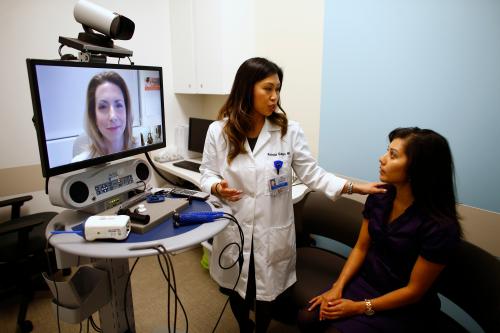With Amazon’s recent announcement about its plans to acquire PillPack, an online pharmacy, it is clear that online health is becoming more mainstream. In particular, telehealth apps for reproductive and sexual health are increasingly popular. Easily accessible birth control and other health care, such as HIV prevention medication or tests for sexually transmitted diseases, has become particularly desirable given geographic gaps in access across the United States. These telehealth apps allow birth control access to a variety of patients in need of reproductive health services but also present several policy and regulatory concerns, including internet access, licensing issues, and safety and privacy concerns. As we solve these regulatory problems and continue to realize the benefits, these apps may become a larger part of the U.S. healthcare system.
A range of health care services
There are several telehealth apps that provide reproductive health services, including Nurx, Lemonaid, and Virtuwell. Each app has slightly different offerings; most provide several different types of birth control and emergency contraception, with many also offering other services such as pre-exposure prophylaxis (PrEP) to prevent HIV, STD testing, and treatment for other reproductive and common health conditions.
These telehealth apps generally start with a questionnaire about symptoms and past medical history. A doctor or nurse practitioner will review the patient’s information and, depending on the app, will quickly connect them to a one-on-one video consultation. If medicine is prescribed, it is sent either to a local pharmacy or to the patient’s home in discreet packaging. Pricing varies, but is generally relatively low even without insurance. For example, Nurx offers birth control for $15 a month for patients without coverage, with no extra cost for the consultation and delivery.
Improving access
These online telehealth apps address the difficulty of accessing birth control and other reproductive and sexual health services. Apps benefit patients that have multiple jobs, cannot afford to take time off, or otherwise lack time in their schedule to go to an appointment at the gynecologist. They also benefit patients who may not feel comfortable visiting a doctor’s office for reproductive and sexual health care, such as disabled people, trans people, and sex workers. In addition, telehealth services can provide access in rural areas, areas with a deficit of specialists, or “contraceptive deserts” that do not have reproductive health care providers in their area. According to the National Campaign to Prevent Teen and Unplanned Pregnancy, almost 20 million people live in areas without access to clinics that can provide them with contraceptive options. Texas, the state which has the highest number of contraceptive deserts as well as the highest repeat teen pregnancy rate, is Nurx’s largest market.
Birth control and the other care that telehealth apps provide is even more accessible because of the relatively low cost, particularly for patients without insurance. For patients without coverage, birth control pills can cost around $20 to $50 a month, not including the cost of a doctor’s appointment to get a prescription, which can cost $35 to $200. The Affordable Care Act guarantees free birth control under most plans, but the potential repeal of affordable access provisions makes these services particularly important.
Despite the potential for telehealth apps to increase accessibility to birth control and other reproductive and sexual health services, there are several policy concerns regarding the new technology. To begin with, these apps require internet access and an electronic device, something underserved populations may lack. In addition, because of state regulations, these companies have only been able to expand to a fraction of states: Lemonaid is available in only 23 states and Nurx is available in 21 (including the District of Columbia). Expanding into a new state means getting the company’s doctors licensed, receiving a business license, and complying with particular telehealth laws that can vary across states. For example, New Jersey requires consultations to be done through video.
Safety and security
Furthermore, there are safety and security concerns. Doctors think that it’s generally very safe to get birth control pills online, but it comes with a few risks. Through the online consultation, doctors should be able to screen for most relevant conditions, but some risk factors, such as high blood pressure—which can lead to blood clotting when combined with the pill—must be evaluated in person. Patients should not substitute online consultations for doctor’s appointments if accessible, since in-person visits can lead to other important health screenings. However, doctors think the benefits outweigh the potential risks, especially since pharmacist provision of birth control, which is similar to online prescribing, has been shown to be safe.
In addition to physical safety, there are concerns about digital security. Telehealth apps must comply with HIPAA’s restrictions on the release of medical information, but the law still allows them to share information if the patient gives consent, possibly unknowingly while skimming the fine print. Data breaches are another possibility, so telehealth companies need appropriate protocols to ensure they protect patient privacy. Audio, video, and other forms of data transmission should be secured through encryption, and multi-factor authentication should be used to secure accounts.
Despite the policy and regulatory concerns, these telehealth companies have the potential to increase access to vital health care to patients who may have otherwise been unable to receive treatment and may become a larger part of our health care system.
Miku Fujita contributed to this blog post.
The Brookings Institution is committed to quality, independence, and impact.
We are supported by a diverse array of funders. In line with our values and policies, each Brookings publication represents the sole views of its author(s).











Commentary
Telehealth apps expand access for reproductive health care
September 12, 2018